By Emily Chaffins -
Photography: CRISTINA CABRERA JARRO | FC
MIAMI | Liturgical music inspired Logan Ramos to return to the Catholic church.
�When I first came back to the church, sacred music drew me in,� Ramos said. �The music at Epiphany helped me focus on prayer. Music is not the center of the Mass, because that�s the Eucharist, but music helps people engage with the liturgy.�
It�s no wonder the young hospital project manager was among the hundreds filling the pews of Epiphany Church the evening of March 15. This Mass, celebrated by San Francisco�s Archbishop Salvatore Cordileone, marked the world premiere of Frank La Rocca�s new Mass setting, �Requiem for the Forgotten.�
The Mass� purpose was to offer prayers for the souls of those who have died without a proper funeral, including the homeless, refugees, and soldiers, said Miami conductor Richard Carrillo.
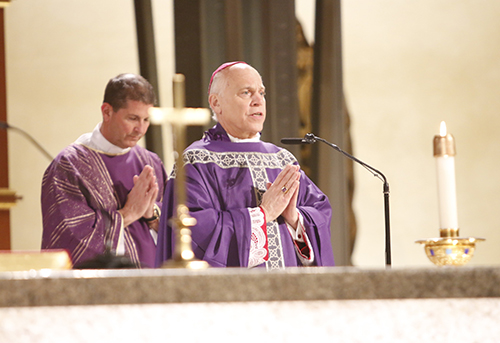
Photographer: CRISTINA CABRERA JARRO| FC
San Francisco Archbishop Salvatore Cordileone leads prayers during the Requiem Mass for the Forgotten celebrated on March 15, 2024, at Epiphany Church in Miami. The music within the Mass was commissioned by the Archbishop, written by Frank La Rocca, and conducted by Richard Carrillo for the world premiere Mass in Miami.
Archbishop Cordileone commissioned La Rocca, the composer-in-residence of the Benedict XVI Institute for Sacred Music and Divine Worship, to create the Mass setting. The piece premiered as �Requiem for the Homeless� in November 2020.
�When we saw the �Requiem for the Homeless� was being repurposed as a fundraiser for Ukrainian refugees, we decided to broaden the focus to all people who are homeless � displaced by war or natural disasters as well as poverty, addiction, and mental illness,� Archbishop Cordileone said in an email interview with the Florida Catholic.
James Matthew Wilson, poet-in-residence for the Benedict XVI Institute, wrote an offertory for Ukraine included in �Requiem for the Forgotten.�
Carrillo, a University of Miami doctorate student and St. John Neumann choir director, conducted two professional ensembles during the world premiere: a choir of 20 singers and an orchestra of viola, cello, bass, harp, and organ. He hoped the music would move hearts, like liturgical music did for Ramos.
�I love how there�s a lot of hype for the �Requiem for the Forgotten� music, but even more importantly, I love that it�s a conduit to prayer and experiencing the Lord,� Carrillo said.
About 800 people gathered for the event, traveling from as far as New York and Jacksonville. Archbishop Thomas Wenski of Miami was unable to attend due to a scheduling conflict.
The Mass included specific prayers for the forgotten. During the �Kyrie,� the cantor sang, �You showed every man who is truly his neighbor� and �You promised eternal blessedness to those who shelter the homeless.� The prayer of the faithful included petitions for those experiencing poverty, unemployment, and mental health difficulties.
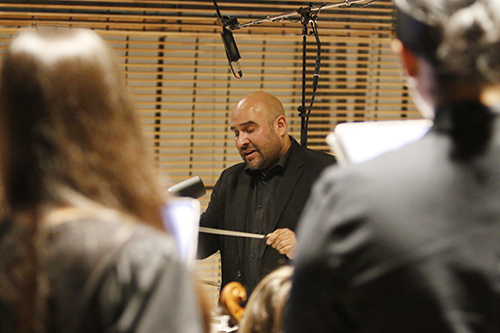
Photographer: CRISTINA CABRERA JARRO| FC
Conductor Richard Carrillo leads the choir of 20 voice professionals, as well as musicians on viola, cello, bass, harp and organ, during the world premiere of the Requiem Mass for the Forgotten, March 15, 2024, at Epiphany Church in Miami.
The music itself was solemn, intricate, and intense. La Rocca used elements like discord and moments of sparseness to transport listeners into the lives of the suffering. In the program notes, La Rocca said his goal was to create �music that befits not how we in the world see the homeless and the refugee � but how God sees them.�
He added, �The deepest need of the Forgotten, like the rest of us, is not simply shelter, but a home � and that ultimate home is the Church; and their nourishment, the sacraments.�
Archbishop Cordileone�s homily focused on enacting the works of mercy in our lives.
�We rejoice in what is truly sacred: God�s truth, and the peace that comes from following it in accordance with one�s rightly formed conscience,� he said. �We also see what results from those who act accordingly. They are the ones... who give selflessly of their material and spiritual blessings to alleviate the sufferings of others. We seek to do that here. To remember. To make sure that our heroes are not forgotten. That the oppressed, destitute, and homeless are not invisible. That the lonely find companionship, and the fearful, a loving embrace.�
Many attendees embraced the call of praying for the forgotten.
Laura Suner from Our Lady of Lourdes parish used the opportunity to pray for a friend who did not have a funeral.
U.S. Congressman Carlos Gimenez and his wife, Lourdes, attended the Mass. �We both came from the oppressive Cuban regime, so this was personal,� he said.
Cuban human rights activist Rosa Maria Paya came in honor of her father, Oswaldo Paya, who was assassinated by the Cuban regime in 2012. Her father was a civic leader �pushing for a transition to democracy,� she said.
�This is a special Mass because of Archbishop Cordileone�s invitation to remember the martyrs of communism,� Paya added. �My father used to say all that he did was for his faith in Christ, so he�s also a martyr for the faith.�
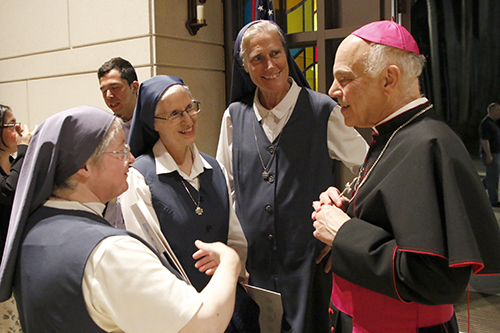
Photographer: CRISTINA CABRERA JARRO| FC
San Francisco Archbishop Salvatore Cordileone is greeted by the Daughters of St. Paul after celebrating the Requiem Mass for the Forgotten, March 15, 2024, at Epiphany Church in Miami.
Also present at the Mass were Esteban Bovo, mayor of Hialeah; Ana Margarita Vijil, Nicaraguan lawyer and human rights activist; Humberto Belli, former Minister of Education in Nicaragua; and Marco Novoa, a Nicaraguan American who was kidnapped and tortured by a paramilitary group in Nicaragua.
�We are alarmed at the growing injustices of the world, brutal repressions of governments fueled by godless ideologies in some parts of the world, and a sort of a secular fundamentalism taking possession of countries that used to pride themselves on being liberal democracies,� said Archbishop Cordileone. �The elimination of God in a society always results in untold suffering and oppression of the many by the few.�
Archbishop Cordileone explained the importance of the liturgy in the midst of this struggle.
�We dedicate the best that we have to remember [the forgotten] in art, music, poetry, and theater, all of the art forms...� he said. �And above all, to direct this all for the church�s liturgy: the worship of the one true God, the most sacred dignity that God has given to his human creation. This is what forms the soul of a culture, which is why atheistic, totalitarian regimes always start by eliminating the priests, poets, philosophers, and the artists in all forms of art.�
�We refuse to allow our society to become soulless,� he added. �We refuse to be robbed of what is most sacred, understanding that it can only be taken away from us if we allow it to be.�
Freelancer Cristina Cabrera contributed to this report.
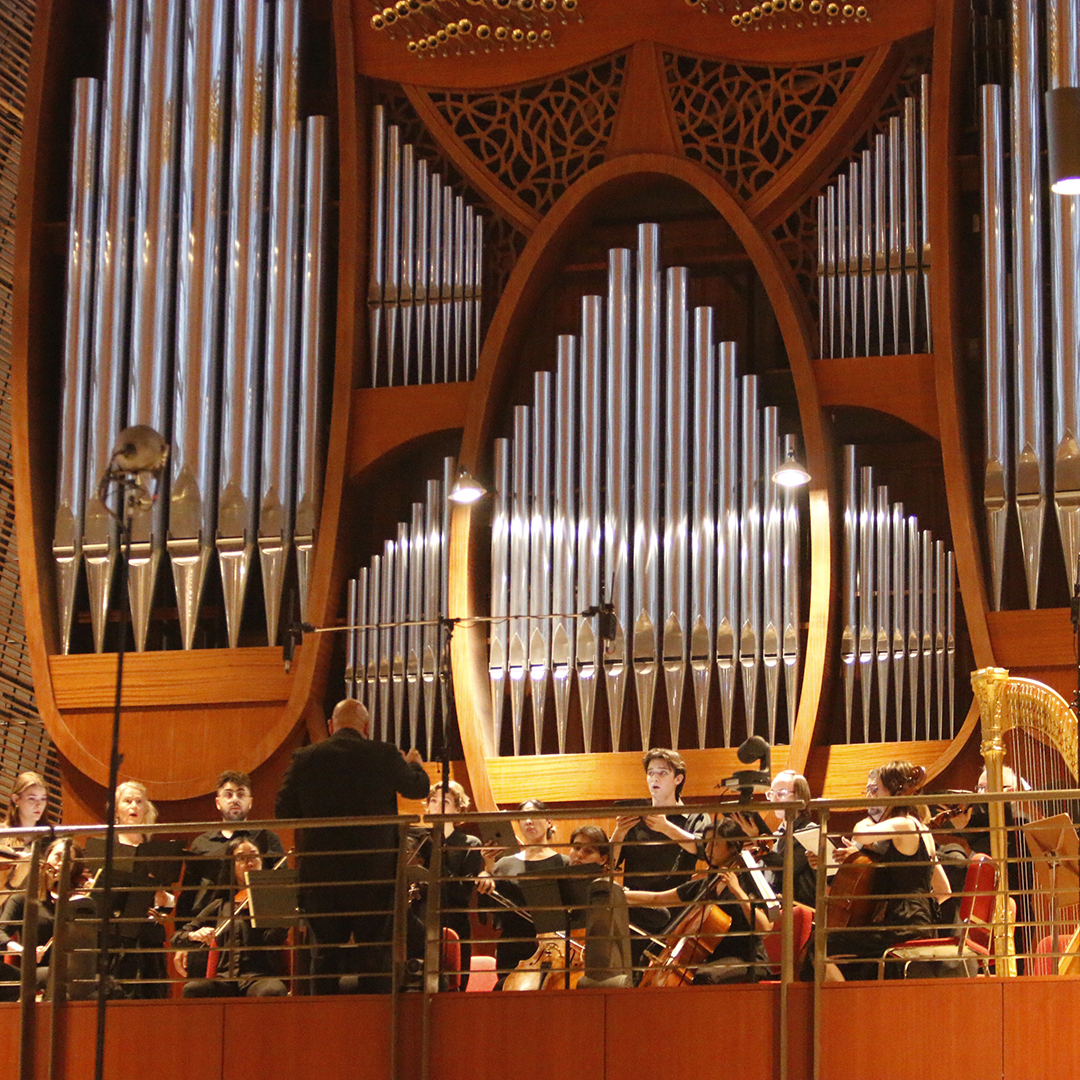
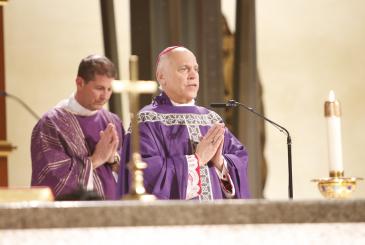
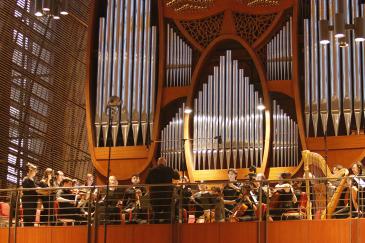
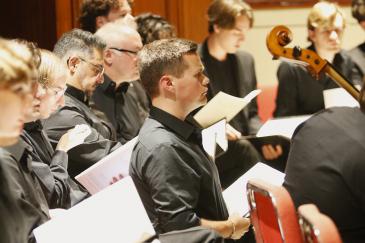
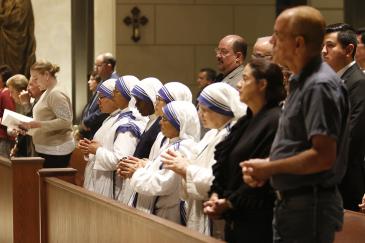
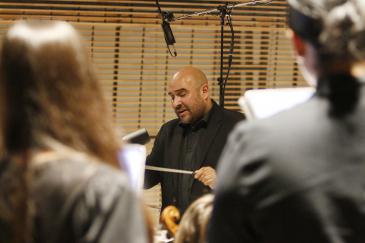
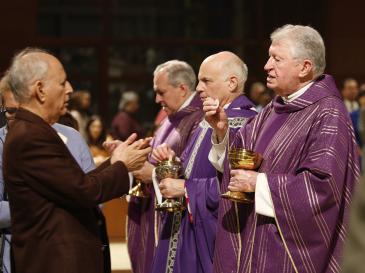
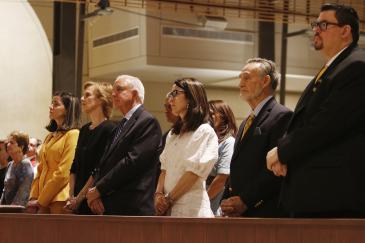
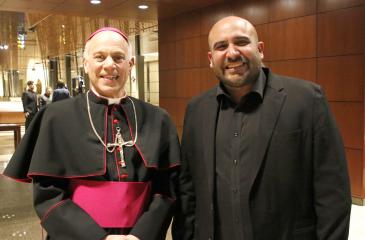
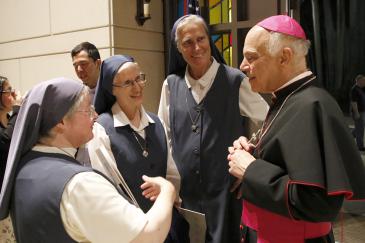

Comments from readers